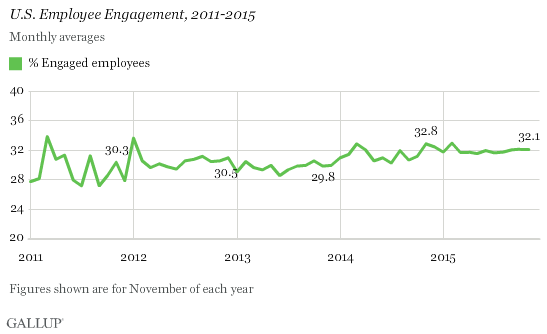 Why? Simply because it's likely not helping your business. It might even be hurting you. Now, if I'm wrong and your survey and the process does build trust within the company, result in meaningful actions being identified and performed, and you see employee relations improve, congratulations. Don't bother reading further. Over and over again I see examples of companies doing engagement surveys that amount to (at best) a wee bit of meaningful discussion at the senior leader level, and the box being checked for having done this. All too often I see businesses do harm with these because they don't report back the data to employees, the senior leaders fail to take ownership of the results, and an action plan that is meaningful and realistic (and one with 25 actions is not realistic) does no emerge. After a couple of rounds of this, employees grow to resent the charade and the relationship between leadership and employees takes a hit. No wonder engagement hasn't increased meaningfully even after so much time and money going into surveys!
0 Comments
 August was a big month for our family. Among the highlights, our oldest child entered kindergarten at a public school that is Montessori-based. The short story is that he LOVES it, which is notable because of the intense struggles he had in a much more traditional environment over the past two years. It is just fascinating to see the transformation, and I can't help but explore what has brought this about. Why does this school/classroom/teacher work so well for him? I'm sure there are many reasons, and some of them (e.g., a break at home over the summer, general maturity) don't have anything to do with the school itself. But there are key elements of this new environment that catch my attention. See if you find anything familiar with these.  Great teams don’t just happen. They take work. They are built on relationships and, like any relationships, they have their ups and downs. Teams are influenced by internal and external factors and they have distinct personalities. If you are the formal or informal leader of a team, how are you influencing the way the team functions? How are you molding the team personality? Are you promoting healthy communications? Are you keeping the focus on the collective? How do you handle challenging moments? In working with teams of all kinds, I see how team leaders (again, the formal or informal leaders) influence team dynamics, either for the better or (inadvertently) for the worse. Here are the 6 key ways I see formal and informal team leaders positively contribute to team function. “How can I get anything accomplished when I have to be worried all the time about whether people like me?”  Is this thought familiar to you? It’s a common frustration for the leader who is committed to employee engagement and positive culture, yet has responsibility for making change and driving performance as well. Is it necessary to have to choose between pleasing others and performing? This piece from Harvard Business Review offers specific about what an over-focus on being liked leads to: paralysis, over-inclusion, accommodation, tolerating poor performance. Have you seen this in action? There is the leader who won’t make a decision and implement actions for fear of backlash. Then there is the leader who is constantly convening “input” meetings and polling people through formal and informal ways. You see a leader consumed with putting out small, internal fires in the spirit of keeping people happy, regardless of whether these actions support the progress of the business. And then there is the leader who doesn’t hold others accountable for performance. And what is the business impact of this “pleasing” dynamic? In a word, significant.  At a local coffeehouse recently, I overheard an informal job interview taking place. I grew queasy listening to the story that the early career job candidate told. “I’m looking at other opportunities because I’m not challenged. I don’t understand what my growth prospects are, or if they exist at this company. We’ve been bought. That was a year ago and everything is still in upheaval. I’ve excelled at everything that I’ve been handed, and I’ve asked for more, but no one will talk about that. I’m ready to go where I can grow.” Ironically, the candidate’s currently employer is formally recognized as a Best Place to Work. *sigh* In this time of focus on the importance of connecting with employees, we are often reminded about the importance of saying thank you. But how do you do that in ways that really resonate?
Think for a minute about moments when a thank you has been extended to you. What thank you gave you energy and built your confidence? What thank you left you irritated, and perhaps saying, “Don’t bother!” When you are sharing gratitude with employees or colleagues (or even with people in your personal life), how can you increase the chances that your thank you has impact? This article Why You Hate Work by Tony Schwartz of The Energy Project came out last week and I feel compelled to write about this because it is such a powerful, yet simple, piece with insights and suggestions based on data and research.
For anyone who has responsibility for managing or leading others, this is a critical read, especially while asking, “What kind of environment do I and our company create for our employees?” Here is what I found to be one of the most striking parts of the article. From a 2013 survey done by The Energy Project and Harvard Business Review, 70% of employees cited that they do not have regular time for creative or strategic thinking. 70% makes for a lot of employees who can only operate on the tactical level, perhaps like the proverbial hamster in the wheel. On one hand, this figure did not surprise me because I have certainly experienced this myself and often seen it in others. But the impact of this intrigues me. What are we missing if so few of our employees have this time? If more employees had more creative or strategic time, what problems might they solve? What new ideas might they generate? How might we outperform our competition?  Most offices have the superhuman employee. Sometimes whole companies are made of these working-a-million-hours-always-taking-on-more-ever-so-committed people. Are you one of the superhumans? Are you requiring others to be? This topic is on my mind a lot right now for several reasons. For the past two weeks, I've been bombarded with articles, videos, and conversations on this subject. It's to the point of being eerie. Have you been reading a lot about this as well? Additionally, this topic resonates with me because I certainly wrestle with the inclination to try to be superhuman. I'm working a lot now on addressing that because I know it's not healthy for me or my family. I also do not I do my best work under these circumstances, which means it's not fair to my clients. The first nudge on this topic was this article on 60-hour work weeks that my friends at Dress for Success Indianapolis shared. It's short and I found it hard-hitting. If we are working 60-hour work weeks, SOMETHING IS WRONG. I don't know how many times I've said that phrase to myself lately. I love that the article talks about the prospect that maybe our job is ill-designed and resources are limited...it's not just pointing a finger at being a perfectionist or workaholic (although those can be issues, too). |
Categories
All
Archives
January 2017
Want more? |
Services |
|




 RSS Feed
RSS Feed